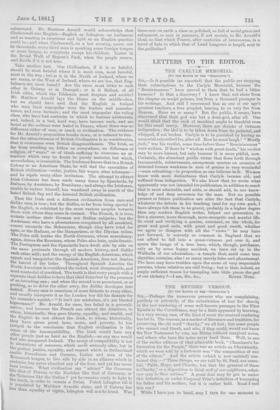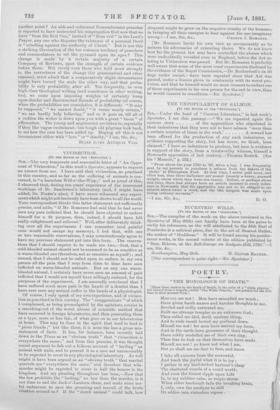THE REVISED VERSION.
[To THE EDITOR Or THE "SPECTATOR."] Siu,—Perhaps the numerous persons who are complaining, publicly or privately, of the substitution of love for charity in the new rendering of some well-known passages in the First Epistle to the Corinthians, may be a little appeased by learning, in a very strong case, of the kind of error the received rendering has led to. The reasons, as a matter of literature and tradition, for preserving the old word "charity," we all feel; but some people who cannot read Greek, and who, if they could, would not know the New Testament by rote, use Bibles without marginal notes, and others who have the notes never heed them. Well, in one of the earlier editions of that admirable book, " Chambers's In- formation for the People," there was an article on Christianity, which we were told by a foot-note was " the composition of one of the editors." And the article (which is now omitted) con- tained this Three things, we are told by St. Paul, are essen- tial, Faith, Hope, and Charity, but that the greatest of these is Charity,' or a disposition to think well of our neighbours, what- ever may be their actions," A great deal may be got in under this definition, as under Corporal Trim's definition of honouring his father and his mother; but it is rather bald. Need I reel this out ?
While I have pen in hand, may I turn for one moment to another point P Au able and cultivated Nonconformist preacher is reported to have instructed his congregation that now that we have "from the Evil One," instead of "from evil" in the Lord's Prayer, any one who disputes the existence of a personal Devil is " rebelling against the authority of Christ." But is not this a striking illustration of the too common tendency of preachers and commentators to set the pyramid upon its apex P This change is made by a certain majority of a certain Company of Revisers, upon the strength of certain evidence before them. But surely even those who hold most strongly to the correctness of the change (for grammatical and other reasons), must admit that a comparatively slight circumstance might have turned the scale the other way, and that proba- bility is only probability, after all. Too frequently, in even high-class theological writing (and. sometimes in other writing, too), we come upon imposing weights of certainty hung upon slender and disconnected threads of probability (of course, when the probabilities are cumulative, it is different). It may be supposed," " we cannot doubt," " it seems nearly certain," " we can hardly help believing," and so it goes on, till all of a sudden the writer is down upon you with a great " boom" of affirmation. The young and acquiescent are taken in, especially if they like vague excitement ; but tough old pilgrims look back, to see how the sum has been added up. Hoping all this is not inconsistent either with " love " or " charity," I am, Sir, &c.,
STARE SUPER ANTIQ,I1AS VIAS.



































 Previous page
Previous page